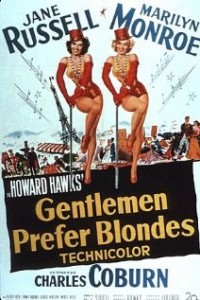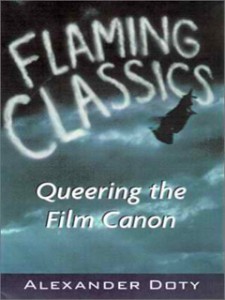In Memorium: Thanking Alexander Doty
 When I began working on this tribute to Alexander Doty, having been asked to reflect on how he impacted me as a young scholar, I found myself struggling to remember the first time I read his work. I certainly remember how I felt when I discovered his writing, that jolt of excitement when you find the work of someone who says what you do not yet know how to in words more eloquent then you could ever muster. Yet by the time I reached a bevy of other firsts–the first time I saw him speak at SCMS, the first time I taught his work on Laverne and Shirley–his writing had already deeply shaped my work; providing the rudder for much of my masters thesis on Big Love. I did not have the benefit of knowing Doty personally, and cannot possibly speak to the profound loss that his colleagues and friends are experiencing. He has been memorialized beautifully elsewhere by those who knew the man, particularly by Corey Creekmur for Flow, but here I wish to pay tribute to the scholar as one of the hundreds who did not know him but mourn him just the same.
When I began working on this tribute to Alexander Doty, having been asked to reflect on how he impacted me as a young scholar, I found myself struggling to remember the first time I read his work. I certainly remember how I felt when I discovered his writing, that jolt of excitement when you find the work of someone who says what you do not yet know how to in words more eloquent then you could ever muster. Yet by the time I reached a bevy of other firsts–the first time I saw him speak at SCMS, the first time I taught his work on Laverne and Shirley–his writing had already deeply shaped my work; providing the rudder for much of my masters thesis on Big Love. I did not have the benefit of knowing Doty personally, and cannot possibly speak to the profound loss that his colleagues and friends are experiencing. He has been memorialized beautifully elsewhere by those who knew the man, particularly by Corey Creekmur for Flow, but here I wish to pay tribute to the scholar as one of the hundreds who did not know him but mourn him just the same.
Doty’s voice was vivid in his work, so open and personal that far more than with most scholars reading his writing felt like listening to someone you knew well. His work brought you into his world, allowing you to re-experience Gentlemen Prefer Blondes or the bothersome but beloved Hitchcock catalog through new eyes. When I had the privilege of hearing him speak, his humor, warmth, and passion were readily apparent and his interest in nurturing a queer scholarly community was obvious; this inviting spirit came through in both his speaking and his writing, including his two pivotal books Making Things Perfectly Queer and Flaming Classics and numerous articles.
This spirit has made Doty’s work my go-to resource when first bringing queer theory, particularly queer reading, into the classroom. Whenever students find it difficult to see beyond the surface of a text, the detailed, lively confidence of Doty’s readings of classic texts opens up whole new ways of seeing to new audiences. Like many great theorists, his work provided numerous tools that has allowed me to be a better teacher not only when teaching queer theory but also when introducing students to decoding texts and varied audience practices. From his work I have seen students adopt a new lens through which they can make sense of media and the world.
While for many what Doty offered was a new way of seeing, for me, and for many others, he gave an even greater gift….a language for what we had experienced and did not yet know how to bring into our scholarly lives. I do not remember the first time I read Flaming Classics, but I do remember discovering for the first time a common language to put a name to what, as a young girl, I had always felt was going on in Batman: The Animated Series between Poison Ivy and Harley Quinn. He showed me how I could use in my work the strange feeling my teenage self had that I saw more of myself in Hawkeye in M*A*S*H then I did Hotlips and how I at once identified with James Bond and the Bond girls. Through his example, Doty showed the value in mining our own, sometimes complicated and conflicted, media consumption and responses in our work. He helped give me the vocabulary with which to explain myself, to bring what I saw in texts into conversation with queer theory. As a young scholar, being given a way to talk about what I saw in a way that was legible to others was an invaluable gift.
Doty’s work passionately argued for the importance of space for both the personal and political in our academic work. In so doing he helped to validate the labors of those of us who do not see academia and activism as antithetical, who find the political valuable–even inescapable–in work we do on queer sexualities and media. By problematizing but creating space for the “I” in our work, he helped to make us aware of our place as distinct readers of media texts even in our scholarly voice. By sharing with his readers little slices of his life and how they shaped him into the scholar that he was, he helped to give us the license needed to attempt to do the same. Doty’s work showed the value of getting beyond the simple empirical and understanding queer reading not as an optional or imposed reading but as simply another facet of a complex text.
It is through this lesson that Doty has impacted all of my work, not only my research on queer reading and representation but much of my textual analysis of media texts. The principles that Doty used in his queer reading practices went beyond the texts he discussed, or even queer reading as a methodology. Rather, it helped me to understand how to approach reading texts with an open mind, a sharp attention to detail and connotative meaning, and to trust the value in the meanings that we can wrest from texts rather than just those that are obviously there.
For all that Doty’s work has taught me, and all that it simply helped me learn how to say, I will always be grateful. While I never had an opportunity to take a class with Dr. Doty, I nonetheless hope that I can count myself as one of his students. I hope through my writing and my teaching, Doty will have many more students in the years to come. I mourn the work that he might have written, I mourn what else I could have learned from him, and I mourn that I gave up my opportunity out of cowardice to tell him how much his work meant to me. I regret that I never was able to thank him for the gifts that his work gave to me. I can only hope that those of us he touched gave something back to him, in the knowledge of the impact that his work had on so many of us and in the growth of the queer media scholarship tradition that he helped to foster.


